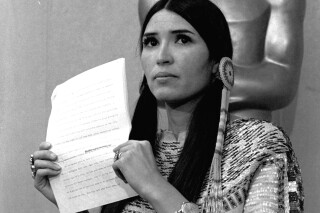Today in History: March 27, ‘The ‘Godfather’ wins best picture, Brando refuses to accept best actor

A woman in Native American Indian dress, who indentified herself as Sacheen Littlefeather, tells the audience at the Academy Awards ceremony in Los Angeles March 27, 1973, that Marlon Brando was declining to accept his Oscar as best actor for his role in “The Godfather.” Littlefeather said Brando was protesting “the treatment of the American Indian in motion pictures and on televison, and because of the recent events at Wounded Knee.” (AP Photo)
Today in History:
On March 27, 1973, “The Godfather” won the Academy Award for best picture of 1972, but its star, Marlon Brando, refused to accept his Oscar for best actor, and in what would become one of the Oscars’ most famous moments sent in his place actor and activist Sacheen Littlefeather, who spoke out about the depiction of Native Americans in Hollywood. (In 2022, months before her death, the Academy would apologize for the “abuse” Littlefeather received at the time.)
On this date:
In 1513, Spanish explorer Juan Ponce de Leon sighted present-day Florida.
In 1625, Charles I acceded to the English throne upon the death of James I.
In 1794, Congress approved “An Act to provide a Naval Armament” of six armed ships.
In 1912, first lady Helen Herron Taft and the wife of Japan’s ambassador to the United States, Viscountess Chinda, planted the first two of 3,000 cherry trees given to the U.S. as a gift by the mayor of Tokyo.
In 1945, during World War II, General Dwight D. Eisenhower told reporters in Paris that German defenses on the Western Front had been broken.
In 1964, Alaska was hit by a magnitude 9.2 earthquake (the strongest on record in North America) and tsunamis that together claimed about 130 lives.
In 1968, Soviet cosmonaut Yuri Gagarin (gah-GAH’-rihn), the first man to orbit the Earth in 1961, died when his MiG-15 jet crashed during a routine training flight near Moscow; he was 34.
In 1975, construction began on the Trans-Alaska Pipeline, which was completed two years later.
In 1977, in aviation’s worst disaster, 583 people were killed when a KLM Boeing 747, attempting to take off in heavy fog, crashed into a Pan Am 747 on an airport runway on the Canary Island of Tenerife (ten-uh-REEF’).
In 1980, 123 workers died when a North Sea floating oil field platform, the Alexander Kielland, capsized during a storm.
In 2012, award-winning poet Adrienne Rich, died in Santa Cruz, California at age 82, while art critic Hilton Kramer, died in Harpswell, Maine at 83.
In 2018, retired Supreme Court Justice John Paul Stevens, in an essay on The New York Times website, called for the repeal of the Second Amendment to allow for significant gun control legislation.
In 2019, Facebook said it was extending its ban on hate speech to prohibit the promotion and support of white nationalism and white separatism.
In 2022, Will Smith slapped Chris Rock on stage at the Oscar and won best actor just minutes later. (Smith was later expelled from the movie academy and received a 10-year ban from the Oscars.)
